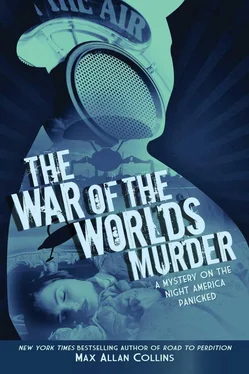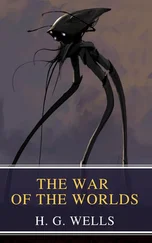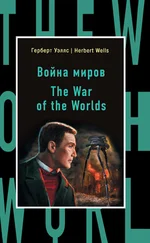Max Collins - The War of the Worlds Murder
Здесь есть возможность читать онлайн «Max Collins - The War of the Worlds Murder» весь текст электронной книги совершенно бесплатно (целиком полную версию без сокращений). В некоторых случаях можно слушать аудио, скачать через торрент в формате fb2 и присутствует краткое содержание. Жанр: Исторический детектив, на английском языке. Описание произведения, (предисловие) а так же отзывы посетителей доступны на портале библиотеки ЛибКат.
- Название:The War of the Worlds Murder
- Автор:
- Жанр:
- Год:неизвестен
- ISBN:нет данных
- Рейтинг книги:5 / 5. Голосов: 1
-
Избранное:Добавить в избранное
- Отзывы:
-
Ваша оценка:
- 100
- 1
- 2
- 3
- 4
- 5
The War of the Worlds Murder: краткое содержание, описание и аннотация
Предлагаем к чтению аннотацию, описание, краткое содержание или предисловие (зависит от того, что написал сам автор книги «The War of the Worlds Murder»). Если вы не нашли необходимую информацию о книге — напишите в комментариях, мы постараемся отыскать её.
The War of the Worlds Murder — читать онлайн бесплатно полную книгу (весь текст) целиком
Ниже представлен текст книги, разбитый по страницам. Система сохранения места последней прочитанной страницы, позволяет с удобством читать онлайн бесплатно книгу «The War of the Worlds Murder», без необходимости каждый раз заново искать на чём Вы остановились. Поставьте закладку, и сможете в любой момент перейти на страницу, на которой закончили чтение.
Интервал:
Закладка:
And the looming war was not the sole source of American jitters-earlier in 1938, a hurricane had hit the East Coast with devastating power; and, the year previous, the first disaster ever to be broadcast live exposed thousands to the explosion of the Hindenburg. When the German zeppelin caught fire at its mooring in Lakehurst, New Jersey, the announcer had been in the midst of describing the huge craft’s grandeur, only to witness…and report in “on the spot” fashion…the bursting flames and the dying people and all the ensuing chaos. His sobs-even his retching-had gone out over the air waves, “live” ….
Just four days before the “War of the Worlds” broadcast, CBS’s prestigious (if little-listened-to) Columbia Workshop aired a verse play by Archibald MacLeish: “Air Raid.” Orson Welles listened to the production on a break rehearsing Danton’s Death, because he had loaned his friend and Mercury regular, Ray Collins, to the production to be its narrator, a mock announcer reporting an air raid from a European tenement rooftop-the whine of attacking planes could be heard, the explosions of their dropped bombs, the sounds of a confused populace running for shelter, machine-gun fire, the screams of victims, including a young boy ….
Though written in verse, and clearly a play, the approach invoked a live news report. Welles heard this realistic radio drama a few hours before he made his suggestions to Howard Koch, John Houseman and Paul Stewart, about revising the script for “War of the Worlds” into a collage of broadcasts interrupted by news bulletins .
As one of the participants in the “War of the Worlds” broadcast would reflect many years later, “The American people had been hanging on their radios, getting most of their news no longer from the press, but over the air. A new technique of ‘on-the-spot’ reporting had been developed and eagerly accepted by an anxious and news-hungry world . The Mercury Theatre on the Air, by faithfully copying every detail of the new technique-including its imperfections-found an already enervated audience ready to accept its wildest fantasies ….”
CHAPTER FOUR
Though he’d had a good (if dream-troubled) night’s sleep-his breakfast with Orson at the director’s suite had not been till ten A.M.-Walter Gibson felt logy, almost groggy, in the aftermath of the Welles morning repast. Enough orange juice, coffee, eggs, sausage, hash brown potatoes with melted cheese, and assorted muffins and sweet rolls had been delivered by St. Regis butlers to attend the gastric needs of your average lumberjack camp.
Perhaps in an ill-advised effort to keep up with his host, Gibson ate around a Paul Bunyan’s worth. Welles ate easily two Bunyan’s plus one Babe the Blue Ox’s worth to boot, conversation scant, the food commanding the boy-man’s full attention. What conversation had preceded and followed the feast touched little on the Shadow project, concentrating instead on their mutual fascination with magic. Welles inquired how Gibson had developed that interest.
“Just before my tenth birthday,” Gibson said, sitting back, the meal finished, having to work to think, his body and all the blood in it occupied with a major digestive task, “I attended the birthday party of a friend-typical kind of kid celebration, you know….”
Welles, also sitting back, hands folded on his belly (he was again wearing the bathrobe with the hotel crest), said, “I don’t remember attending any birthday parties as a child.”
“Pin the tail on the donkey, games of tag, plenty of cake and ice cream…”
Welles-who loved being on either end of a story, and listened with keen, obvious interest-lighted up one of his pool-cue cigars.
Gibson was saying, “The parents of my young friend, a girl, knew that my birthday was coming up fast, as well, and perhaps out of deference to me, they came up with a special game: each child was presented with a long ribbon that disappeared out of the parlor into the house-a two-story house, Victorian in style. Some ribbons slithered like snakes around the furnishings, to go up and down the stairs, others led out the front and back doors….”
“Walter,” Welles said, sighing smoke, “you paint a vivid picture-as always.”
“Thank you. Anyway, each child followed the ribbon through the house…and we all were led to a present of our very own!”
“Ah!”
“Mine led up the stairs and into a guest bedroom, where under the bed I discovered my prize…” Gibson leaned forward, milking it. “…a box of magic tricks.”
Welles’s eyes widened, as if his guest had reported discovering Blackbeard’s hidden treasure.
“It was German-made, with all the standard tricks of the day-I suppose, objectively speaking, it was nothing special. But it changed my life. It was as if that ribbon had led me to my future.”
Welles, smiling with delight, eyes sparkling, said, “No wonder we’re kindred spirits! My godfather gave me a professional magician’s box of stage tricks-I was five! And it was my godfather, my guardian-Dr. Bernstein-who took me backstage to meet Houdini, when I was six!”
Finally , Gibson thought, the Houdini story. Would it be true?
“I apparently impressed the great man with my childish enthusiasm-I blurted out virtually everything I knew about magic in a matter of a minute or two-and that was how I came to be taught a simple but effective trick with a red handkerchief, presenting me with everything I needed to pull it off myself-the vanishing coin trick?”
“I know it well.”
Placing a handkerchief over the left hand, the magician pokes a pocket in the cloth, so that the coin can be dropped there; then the magician shakes the handkerchief…and the coin has vanished! (This was achieved by having a rubber band around the fingers and thumb of the left hand, which closed the “pocket” the coin was pushed into, so that the coin remained caught and hidden when the handkerchief was shaken out.)
Welles leaned forward, one eye narrowed. “I was always a quick study, so I followed Houdini to his dressing room like a stray puppy. He glanced around at me, not knowing whether to be irritated or amused. ‘Look, sir!’ I said…and I performed the trick for him!”
Gibson chuckled and clapped, once.
Welles lifted his eyebrows. “Well…let us say that the great Harry Houdini was less than overwhelmed by my childish legerdemain. He gave me a stern scolding: never, ever was a trick to be performed until it had been practiced a thousand times!”
“Not bad advice.”
“ Splendid advice…but there’s more. I practiced and practiced the vanishing coin trick, and a few months later, when Houdini returned with his stage act, we again went backstage, before the show…this time it was with my father accompanying me, on a rare visit home…and were welcomed warmly. Houdini remembered my obnoxious, precocious little self. I was about to demonstrate my improved stagecraft when a certain Carl Brema arrived-”
Gibson grinned. “Of course-the manufacturer of magic tricks.”
“Yes. Brema had a vanishing lamp trick he’d just perfected. He demonstrated it for Houdini, who beamed and said, ‘Wonderful, Carl-I’ll put it in the show tonight !’ ”
Welles’s roar of laughter was worthy of Henry the Eighth, and Gibson-despite the overeating-inspired discomfort-joined in heartily.
Now Gibson believed Welles had really met Houdini-the story sounded just like the man….
“ There’s a coincidence,” Gibson said, “that further cements our destiny together.”
“What’s that?”
Читать дальшеИнтервал:
Закладка:
Похожие книги на «The War of the Worlds Murder»
Представляем Вашему вниманию похожие книги на «The War of the Worlds Murder» списком для выбора. Мы отобрали схожую по названию и смыслу литературу в надежде предоставить читателям больше вариантов отыскать новые, интересные, ещё непрочитанные произведения.
Обсуждение, отзывы о книге «The War of the Worlds Murder» и просто собственные мнения читателей. Оставьте ваши комментарии, напишите, что Вы думаете о произведении, его смысле или главных героях. Укажите что конкретно понравилось, а что нет, и почему Вы так считаете.

![Герберт Уэллс - The War of the Worlds [С англо-русским словарем]](/books/26611/gerbert-uells-the-war-of-the-worlds-s-anglo-thumb.webp)










